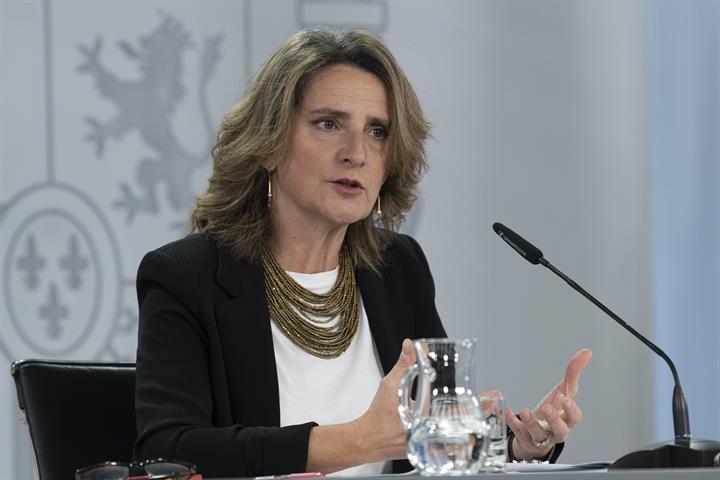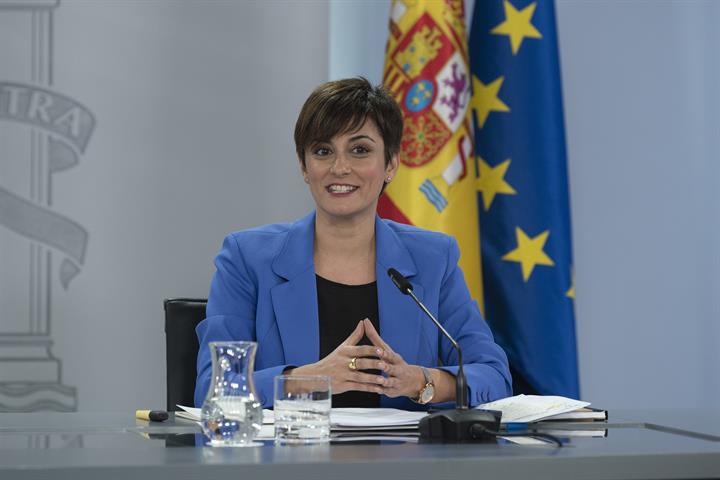Council of Ministers
The Government of Spain approves the Third Cycle Hydrological Plans to modernise the management of water resources until 2027
Council of Ministers - 2023.1.24
Moncloa Palace, Madrid
The Council of Ministers has approved the Third Cycle Hydrological Plans, which define the lines of action for managing water resources in Spain from now until 2027.
In Spain there are 25 river basins, twelve of which depend on the General State Administration because they cross more than one regional government. The government has approved the plans for these twelve basins and those of Galicia, Costas and the Balearic Islands, as the body also responsible for the hydrological plans for inland and regional basins.
The Third Vice-President of the Government of Spain and Minister for Ecological Transition and Demographic Challenge, Teresa Ribera, stressed that for the first time, these plans incorporate climate change scenarios in a coherent manner and set ecological flows for all bodies of water. Specific plans have also been included for emblematic areas such as Doñana, the Mar Menor, the Ebro Delta, the Tablas de Daimiel and Valencia's Albufera.
The planning includes more than 6,500 measures with an investment of €22.84 billion: "Never before have there been so many resources to invest in water and in such a thorough modernisation of water policies," Ribera stressed.
The main categories of investment will be sanitation and treatment, modernisation of irrigation, improvement of water supplies, flood risk management, restoration of the public water domain, construction of infrastructure and digitisation of the water cycle to ensure more efficient use.
Additional water inputs, purification and reuse
 Third Vice-President of the Government of Spain and Minister for Ecological Transition and Demographic Challenge, Teresa Ribera, during the press conference after the Council of Ministers | Pool Moncloa/Borja Puig de la Bellacasa
Third Vice-President of the Government of Spain and Minister for Ecological Transition and Demographic Challenge, Teresa Ribera, during the press conference after the Council of Ministers | Pool Moncloa/Borja Puig de la Bellacasa
Teresa Ribera explained that the plans scrupulously comply with European and Spanish legislation as an "unquestionable premise", anticipate a problematic scenario of water scarcity due to climate change and seek to ensure a balance between available resources and existing demand.
Since 1980, the average available water has decreased by 12% and projections indicate that by 2050 there may be a further decrease of 14-40%. "We cannot guarantee water supply for drinking water or for economic uses by relying exclusively on rain", said the minister, who defended the importance of additional supplies such as desalinated and reused water, which is "as precious as surface water and water from aquifers".
Regarding aquifers, the plans aim to ensure that the use of their waters does not exceed their regenerative capacity. A total of 40% of underground resources are currently in a poor state of conservation.
In the same line, the minister emphasised that it is necessary to invest more in sanitation and purification, as Spain continues to pay coercive fines for delays in complying with its obligations in this respect, and "there are still a significant number of infringement proceedings open with the European Commission". Proper purification will also mean containing nitrates and pesticides and other emerging pollutants such as microplastics and antibiotics, so that the water is fit for use and reuse.
Gradual implementation of the ecological flow in the Tagus river
During her speech, the vice-president focused on the hydrological plan for the Tagus basin, a river which not only flows through several Spanish communities but also flows into Portugal, a country with which there is a bilateral agreement to guarantee the good management of the resource.
For the first time, an ecological flow has been set and its implementation will be gradual. It will start this year at 7 cubic hectometres (hm3), and in 2026 and 2027 it will be 8 and 8.65 hm3, respectively. "The differentiation in time is because we want to reconcile the legislative requirements with the social, economic and environmental impact", Ribera explained, so that "it cannot pose any risk to the availability of sufficient resources in the basins that have been benefiting to date from the Tagus-Segura aqueduct".
According to Ribera, the investment to guarantee additional inflows between now and 2027 will make it possible to compensate for the maximum reduction in water that could be transferred. In the worst-case scenario, this reduction would be between 70 and 110 hm3, while investment in desalination plants, reuse and irrigation efficiency programmes would save at least 140 hm3. "There is also an addition advantage, given that nobody can control whether it rains or not, which is the control of how much is desalinated, how much is reused and how these extraordinary contributions can be managed," he added.
Commitment to the driest watersheds
Ribera has expressed the government's "total commitment to the driest basins in the Levante region", where additional investments will be made and an exhaustive monitoring of the action schedule will be carried out through a bilateral commission with each of the regional governments affected, Andalusia, the Valencian Community and the Region of Murcia.
The provinces of Alicante, Almeria and Murcia will receive €547 million to increase the capacity of existing desalination plants, and interconnections between these infrastructures will be established to ensure that the entire territory is covered. Similarly, a compromise has been reached on the price of desalinated water so that it does not represent an unbearable burden for farmers and, although it is pending final approval, it could be set at around €34 per cubic hectometre.
Energy saving certificates
The government has regulated the system of Energy Saving Certificates, a new tool that will make it easier to meet the energy saving targets committed to by the EU.
The measure will provide gas and electricity traders, wholesale oil product traders and retail liquefied petroleum gas operators with an annual energy savings quota based on their sales. It will also benefit consumers and boost employment, productivity and business competitiveness.
In this regard, Teresa Ribera stated that the regulation of certificates will boost the role of the private sector in terms of "investment initiatives that allow us to recognise savings and efficiency in energy consumption".
Improving air quality
The Council of Ministers has updated the framework of actions to combat air pollution and improve air quality.
The measure will reduce pollution, especially in large cities, and complements other initiatives already underway, such as the Health and Environment Plan and the Air Quality Index.
Teresa Ribera stressed that the decision will make it possible to have specific and homologous instruments throughout the territory, and to strengthen the dissemination of warnings and improve response capacity.
Modification of Personal Income Tax to comply with the Artist's Statute
 The Government Spokesperson and Minister for Territorial Policy, Isabel Rodríguez, during her speech at the press conference after the Council of Ministers | Pool Moncloa/Borja Puig de la Bellacasa
The Government Spokesperson and Minister for Territorial Policy, Isabel Rodríguez, during her speech at the press conference after the Council of Ministers | Pool Moncloa/Borja Puig de la Bellacasa
The Council of Ministers has agreed to amend the Personal Income Tax Regulations to comply with the Artist's Statute. The measure aims to provide more liquidity to the lowest incomes in this group.
The Minister for Territorial Policy and Government Spokesperson, Isabel Rodríguez, has specified that the minimum withholding rate for artists subject to a special employment relationship has been reduced from 15% to 2%; and the withholding rate for artists who pay taxes as self-employed with an income of less than €15,000 has been reduced from 15% to 7%.
Both measures, the minister pointed out, have been agreed upon in the Interministerial Commission for the Development of the Artist's Statute. He added that this is the first time that a government has taken a comprehensive approach to creators, both in their professional performance and in their labour rights.
Isabel Rodríguez pointed out that a fortnight ago the Chief Executive also recognised the first special unemployment benefit for workers in the cultural and artistic sector. "The government's objective is that creators and cultural technicians can make a decent living from their work," he said.
The spokesperson recalled that the Lower House of Parliament unanimously approved the report for the drafting of the Artist's Statute in 2018, and that 80% of the measures envisaged in the regulation are already in place.
Use of vacant social security buildings
The government has agreed to amend the regulations to make it easier for other administrations to use property owned by the social security system and which are not being used by any of its managing bodies.
Assigned or transferred assets must be used for public utility purposes. According to the internal audit carried out by the General Treasury of the Social Security, there are 1,028 empty properties, ranging from buildings to plots of land, an including business premises, rural properties, warehouses or garages.
Isabel Rodríguez stressed that the reform has three objectives. First, to create the concept of free secondment to another public administration, removing all bureaucratic obstacles and impediments; second, to regulate the transfer of use to other public purposes, non-governmental organisations, associations or other entities willing and able to take over these assets to provide a service to the public; and third, to comply with the commitment made by the Social Security Treasury to present a plan to optimise and improve the management of these assets within a period of three months.
Non official translation




